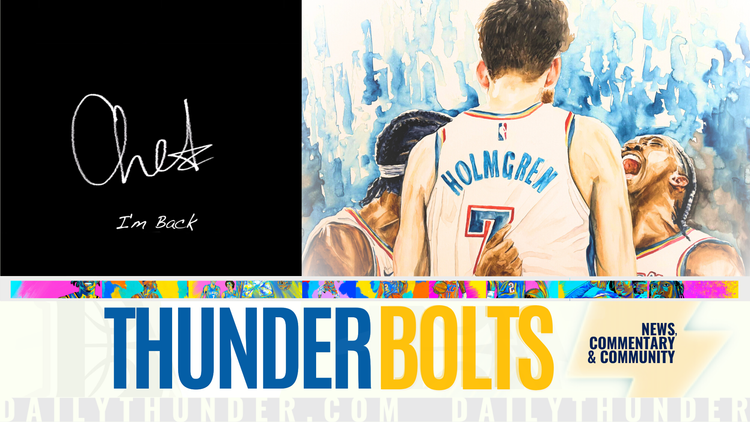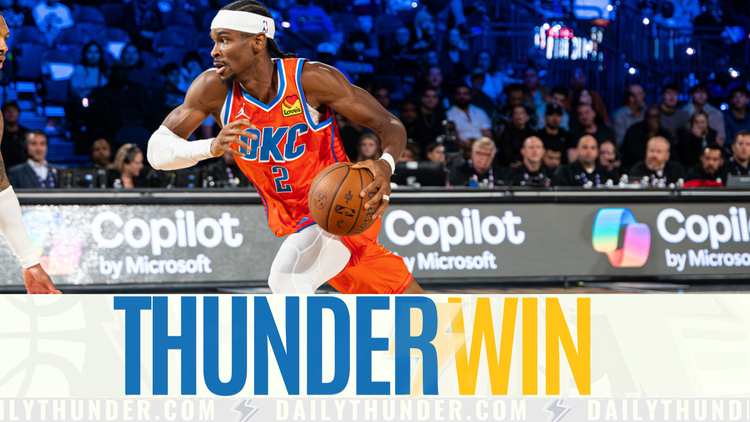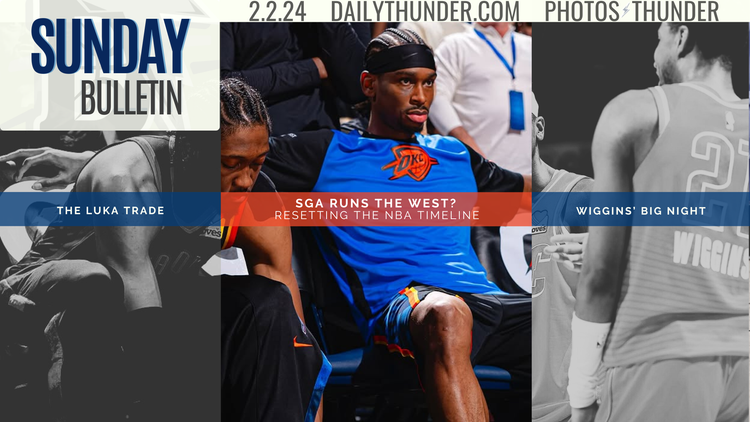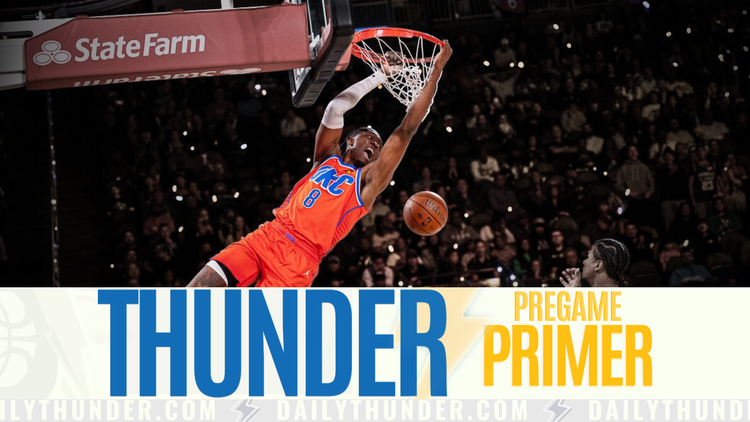United Nations of Thunder

After years of Thunder teams dominated by superstars, this season marked a sharp divergence from what had become OKC’s tried and true style of play. The your-turn, my-turn isolation approach from the Kevin Durant and Russell Westbrook eras was highly effective, but had also become highly predictable and familiar to opponents and fans alike. In contrast, the 2019-20 Oklahoma City lineup that has been as effective as any of those star-driven units (and the best in the NBA this season) is a dynamic, surprising mix of ball-handling, shooting, defense, and funky size.
The diversity doesn’t stop with the skills arrayed 1-5 from the group; each player hails from a different country:
- Chris Paul – USA
- Dennis Schröder – Germany
- Shai Gilgeous-Alexander – Canada
- Danilo Gallinari – Italy
- Steven Adams – New Zealand
The United Nations lineup.
Any given possession could end with a variety of outcomes these players are known for: an icy midrange jumper, a floater off a lightning-quick drive, a scoop shot through traffic, a bomb from deep, or a thunderous dunk. The democratization of the offense is undeniable: only once in the Thunder’s history has the team featured more than two scorers averaging 17 or more points per game. This season, they have four such players. And with the new distribution channels in place, those points arrive after a hand-off at the nexus of Thunder junctions. An Italian three-ball by way of Canadian kickout; a German layup downhill from a Kiwi screen assist; an old-fashioned American elbow swish, with spacing courtesy of the allied shooting and finishing threats dotting the map of the court.
Top-heavy units like Thunder teams of the past thrive on individual brilliance and force of will. When the talent is spread out more, as it is this season, chemistry is paramount. Everyone can eat, but only if the cooks aren’t bothered by a crowded kitchen. The modern NBA landscape has been marked by the buddy system; superstars team up together, often the result of shared interests and experiences–friendship, in other words–making the prospect of playing together more appealing. It’s hard to describe the coalescing of this OKC roster as anything more deliberate than “thrown together”, a result of quick-strike trades, unheralded draft selections and fliers, and holdovers from rosters constructed around a now-vacated star core. But it’s worked, and preseason concerns about disgruntled players who had little say in choosing Oklahoma City as their destination have proven entirely unwarranted.
Danilo Gallinari told Daily Thunder that the international makeup of the roster has become a bonding tool for the players off the court. “(When) you’re spending time on the plane or on the bus, or in the hotel, you ask about their countries…I ask a lot of questions” Gallinari said, specifying Schröder, Adams, Gilgeous-Alexander, and Paul as subjects for his curiosity. “Questions about their life before coming to the States and their introduction to the NBA, to the States.”
Perhaps the blank slate these players started with, without pre-existing cliques or hardened perceptions of what kind of teammate each would be, helped them reach the elusive plane of e pluribus unum. Unity in diversity.
From electric to eclectic
“The NBA is one of the leading global brands, you know? There (aren’t) 10 brands that are better known than the NBA,” Oklahoma City Mayor David Holt told Daily Thunder. Holt says that the reach of the team has a significant impact on the city. “When you’re one of the 30 cities that get to be a part of that, that’s just an incalculable benefit for our city.”
It’s long been said that having an NBA team put Oklahoma City on the proverbial map. But after shuffling the deck last summer with the shocking trades of Paul George and Westbrook, the new pieces broadened the appeal even further throughout the globe. Now, OKC isn’t just synonymous with the names of perennial MVP candidates to fans all over the world–it’s where heroes of global locales reside.
The Spurs earned a reputation for identifying and developing undervalued international talent while the rest of the league lagged. While that knack for finding the best players around the world pays dividends for any team on the court, for a small market franchise like Oklahoma City–whose closing lineup is the only one in the NBA representing five different nationalities–becoming accessible to new audiences where those players are superstars in their own right carries extra import.
We’ve spoken with several Thunder fans around the world, and none of them imagine they’d have any reason to think once, let alone twice, about the city that houses the team were it not there to begin with. The initial draw for a long distance fan is almost always a player. Westbrook was the lightning rod that brought many of the current faithful on board, but his singular electricity has been supplanted by an eclectic new group whose array of talents and backgrounds serve as entry points for a variety of hoops fans both here and abroad.
For international fans, the Thunder are Oklahoma City. Holt says that’s not limited to NBA viewers, and hangs the city’s identity on Thunder basketball. For a city forging a path to international respectability, the more global the reach of a local feature like the Thunder is paramount.
“I’ve always felt the far more substantial benefit is the one that is much less easy to quantify. You’re now a part of a global conversation,” Holt says, noting that benefit transcends the direct economic outcomes flowing to local businesses on game nights. “Having a professional sports team in America is sort of a shorthand signal for people that you’re a city that’s got enough population, enough corporate presence, enough everything to sustain hosting one of these 30 teams.”
According to Holt, the city draws an audience with international companies they wouldn’t without the team. “People just pay attention to us in a way they never would have before.”
Hoops globalism: a two-way street
The benefits of OKC’s global makeup and interest is not unidirectional. If you think basketball is good for the world, then Thunder players are exporting loads of precious hoops cargo to their home countries. Adams is building a basketball legacy in New Zealand, conducting camps and events for the game he loves there every offseason. Both Gallinari and his father have suited up for Olimpia Milano, and he’s said he’d like to finish his playing career lifting that team to Euroleague glory. Schröder has juggled his NBA responsibilities with a commitment to raising Germany’s ceiling in international play. Gilgeous-Alexander has donned Team World jerseys in consecutive Rising Stars contests at All-Star Weekend, and was part of a recent wave of commitments to Team Canada for future FIBA play. And of course, Paul has used his presidential stature and influence to direct resources into the communities and institutions he believes in, stateside.
The global composition of the team doesn’t end with the United Nations lineup. Abdel Nader is trying to raise expectations for Egyptian basketball, and Lu Dort is a basketball beacon for immigrants in Montreal, whose shared origins he’ll signify in Haitian Creole on his custom jersey in Orlando.
And in a global health crisis, the shared concerns of the international neighborhood transcend the isolation enforcing distance between nations and would-be crowds. All eyes descended on Oklahoma City that fateful night in March, when the Thunder/Jazz contest (and NBA season) was suspended after Rudy Gobert produced the league’s first positive COVID-19 test. But before that, Gallinari was an oracle of what to expect to NBA onlookers who had ears to hear. As he worried about his family and friends already sheltering from a vicious coronavirus curve in Italy, he broke the ice as a player welcoming the prospect of a league-wide shutdown out of concern for public health. Now, fans from Oklahoma City to Brunswick are tuning into games broadcast from Orlando, rabid to watch their favorite sport again–a prospect that still feels fragile while the pandemic roars on just outside the sequestered NBA environment.
Gallinari has offered his perspective as encouragement that the league’s bubble-like return to play is safe and worth the effort. “I’ve been able to travel around the world,” he told media in his first dispatch from inside the Orlando campus. “I’ve seen bad situations. Our set up is great.”
Can the NBA pull off the season’s belated conclusion and shine as a model for major sports around the globe? And can the the most diverse NBA roster shock the Disney World?
“We are hungry,” Gallinari declared in that earlier media session. “We’re here for basketball and also for many, many other reasons.”
Like the partial and interrupted season before it, the Thunder hopes for this second season of sorts again converge with the unlikely pursuit of something greater than the sum of their parts. And now, more than ever, the world is watching.




